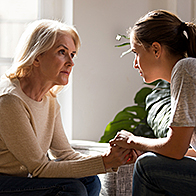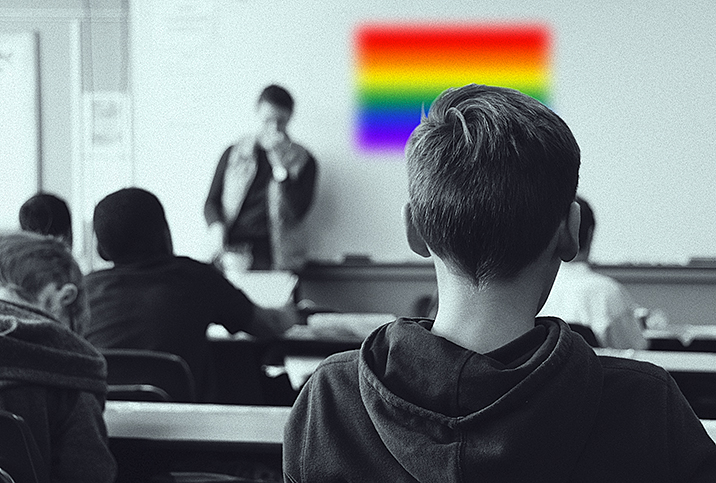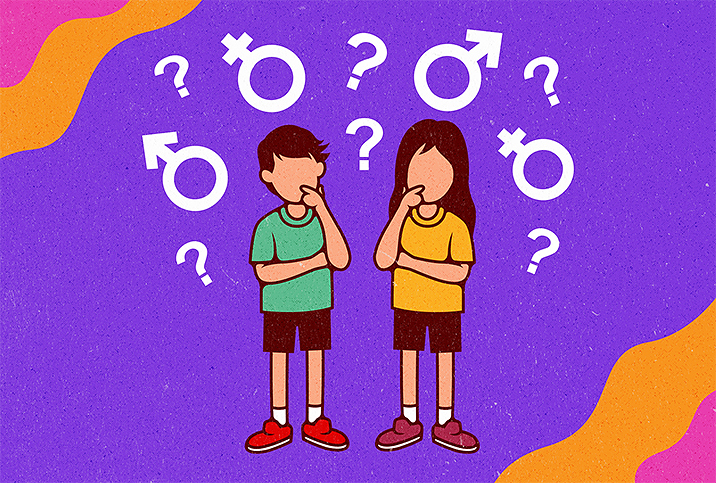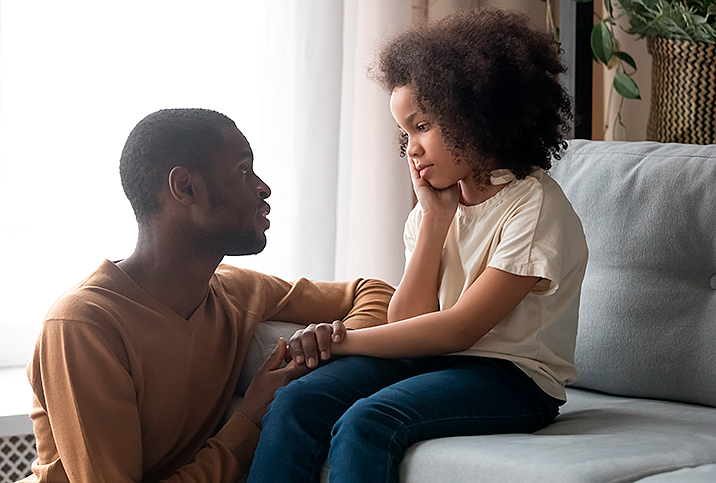How I Talk to My Teenager About Pornography
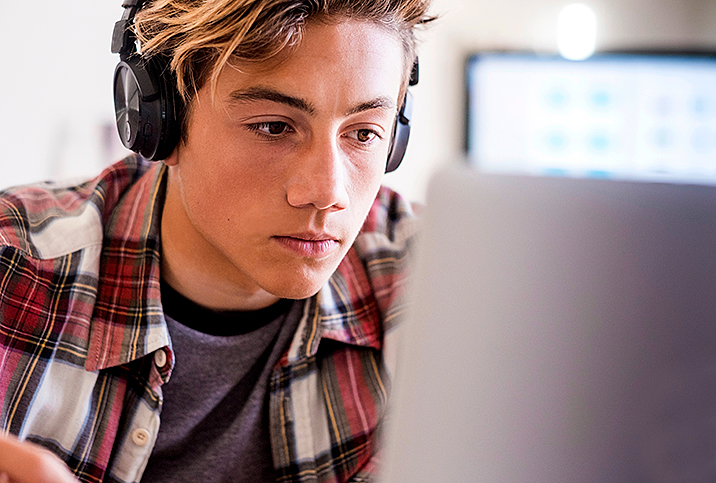
In the minefield of uncomfortable conversations to have with your kids, porn's exceptionally high on the danger rating. While broaching the topic of sexuality with teenage boys isn't on most of our bucket lists, digital culture makes it more prescient and imperative than ever.
The ubiquity of online porn has created an entire market of parental control tools, and surely one (or a handful) of those would keep porn out of our kids' sight and resolve the problem—or at least kick the can into oblivion. But if teenagers are experts in anything, it's how to evade their parents' rules and enforcements, and navigate the internet, so the choice to put filter programs on teens' devices could just be futile.
Defining pornography within the family setting
Health educator Michelle Rawcliffe emphasized before parents start speaking to their children about porn, they first need to educate themselves.
"Be curious and have an open mind," Rawcliffe said. "Understand that as an adult, it is possible that young people are more knowledgeable about sexually explicit media than adults. Take advantage of teachable moments. Be prepared to acknowledge questions when presented, even if the answer is not clear. I may respond with, 'Thank you for asking that question' or 'I appreciate you asking that question.' This may also provide an answer to the question regarding how early you should talk to your child about sex. Let them initiate [the conversation] unless another opportunity presents itself."
The priority is ensuring the conversation, no matter how it occurs, takes place. Teens are going to learn about and view explicit sexual content, and it's our role as parents to frame the conversation in a way that can influence how this content is interpreted.
Ryan McPartlin, actor and father, reveals how he talks to his sons about sex and pornography. Watch the full interview here.
"Learning about sex by watching porn is like learning physics by watching "Transformers,"" said clinical psychologist Ali Mattu.
By acknowledging pornography as entertainment, parents are more likely to assume the role of a primary sex educator. Another lesson to learn is, when speaking to teens, we should remember it's not just what you say, but how you say it.
"[You should] maintain neutral nonverbal communication," Rawcliffe said. "Young people will attempt to read facial expressions to determine if there is judgment. Talking about sex or pornography as good or bad applies a value that may close the door to communication. Students who are shamed or feel shame for viewing sexually explicit material or for just being curious just feel bad. They might not actually learn anything or hear what the adult is saying. Answer with bias-free, medically accurate information."
Reframing the conversation
When talking to teens about pornography and, by extension, sex, it's important we reframe the conversation.
"Center your messaging on their safety, fulfillment and pleasure," said Justine Ang Fonte, an intersectional health educator. "Since the introspection is often bypassed, encourage them to ask themselves questions, such as: Is what you are watching in service of your physical and emotional safety? Does it make you feel good about yourself? What do you enjoy about it? What is uncomfortable about what you see?
"As their parent/caregiver, let them know that you want them to know how to engage in intimate behaviors safely—does mainstream porn model how to navigate relationships in a healthy way?" Fonte continued. "You want them to be a fulfilled human being who is secure with their body and identities—does mainstream porn cultivate that? You want them to know how their body works and to make it feel good in a variety of different ways—is there a dependence on mainstream porn to feel good?"
Directing the conversation toward goals and standards, and away from shame, has a number of benefits. It cultivates a better relationship with sex going into adulthood, and opens the door for conversations about what to do when intimate interactions become reality. For example, Rawcliffe believes approaching porn without negative connotations can lead to more informed consent in real-world interactions.
"Sex positivity naturally occurs when discussing consent. One of the key characteristics is that consent should be enthusiastic," Rawcliffe said. "Planned Parenthood has a resource on this called FRIES. It stands for freely given, reversible, informed, enthusiastic and specific. Rather than present sexual health as something students will always have to say no to, discuss why and when they might say yes. Empower students to take responsibility for their own sexual health."
How pornography can affect your teen's body image
Though porn might help a teenager learn more about sexuality, it could set unrealistic expectations with regard to body image.
"Teens are still going through puberty and often feel insecure about the changes occurring in their body," Fonte said. "Much of mainstream porn includes bodies that meet a specific standard of beauty. Like photoshopping and filtering of photos, we need to remain media literate about the bodies that audition to perform and are curated to be in scenes. Size of body parts, hair and lack thereof, and race as a genre implies that attractiveness is not subjective but defined for viewers by porn producers and directors."
Breaking away from this messaging starts with reminding teens that these are actors who auditioned for a part and were hired for reasons that undoubtedly have nothing to do with the video's storyline or their ability to deliver lines.
'Be conscientious of how you talk about your own body and others' bodies—teens are listening.'
Help your kids understand what they're seeing is scripted, manufactured and deviates far from reality. Producers of these materials have predefined what they consider to be attractive, and this perceived standard should not determine how our kids evaluate and value themselves.
Fonte encourages parents to "be conscientious of how you talk about your own body and others' bodies—teens are listening." She believes this "helps teens to expand their definition of what's attractive and beautiful."
Fonte added parents should encourage teens to "regard their body with function over fashion. Consider how incredible our bodies are and what they do to keep us safe and provide us with joyful experiences. People who recognize that about themselves tend to have passion and chase that type of fulfillment, which in turn, demonstrates a genuine appreciation of their body. That confidence is attractive."
A parent's instinct is to protect their child from harm. While there may be real harm associated with exposure to pornography, helping teens better learn how to synthesize what they see may be the best long-term approach. Conversations should be curious instead of intrusive.
If you're worried about issues surrounding your kid's porn consumption, engaging the help of a third-party therapist can be a smart move. Resources are available to help families dealing with these issues. Be open-minded when discussing this kind of media with your children, and know you were once curious about the same materials and subject matter.








